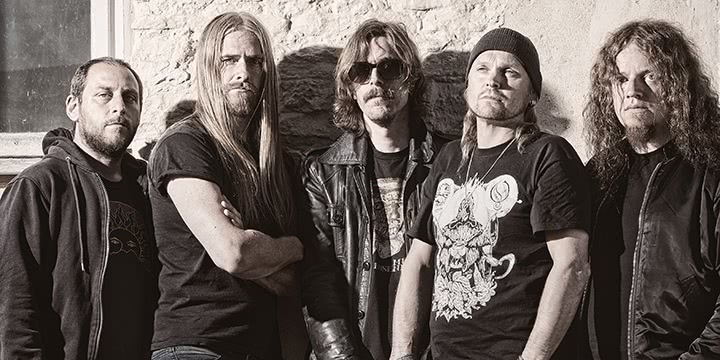It’s the calm before the storm.
Opeth’s Fredrik Åkesson answers the phone from his home in Sweden, in the midst of a day of press ahead of the next leg of the metal monoliths’ Sorceress World Tour. “I’m just sitting here playing a bit of guitar,” Åkesson says coolly. “Just practising a few songs before the tour – refreshing the old memory, so to speak.”
Åkesson must indeed have a long memory, because since the band’s formation in 1989, Opeth have been the definition of invention over appropriation. Along the way, they’ve spectacularly transformed 12 game-changing studio albums into live performances of powerful command. It’s no wonder their upcoming Sydney show in support of latest album Sorceress sold out in record time. As part of an innovative concept of performances at three historic global venues, the genre giants will play the Sydney Opera House this month, giving their loyal fans a back catalogue of classic Opeth alongside the new release.
“We don’t have time to pick a song from every album because there’s so many of them,” says Åkesson. “But there’s quite a lot of heavy stuff in this set, a good balance of the older albums. We’ll definitely play stuff we’ve never played before, especially in Australia – the Damnation and Deliverance albums. It’s a different set, we’ve swapped some songs out for others. It’s a good, dynamite set, definitely a lot for the heavy heads as well.”
The diversity of Opeth’s catalogue bestrides conventional metal. Their continual evolution and commitment to growing their fan base have seen the band redefine the parameters of the genre. Sorceress is still a heavy record, but evidently Opeth have been prompted to move away from the more aggressive tones that defined their earlier albums, for the sole reason of achieving something new.
“I think we felt the band had taken it to its limit in a while,” says Åkesson. “On Watershed, [the heaviness is] still there, and when it comes to a live situation, it’s still something we enjoy to play. It’s not that we’re trying to shy away from it, it’s just we’re trying to do something different.
“At the point we did Heritage, [frontman Mikael Åkerfeldt] had a few songs already written that had come the same way as Watershed and he said we should do something different. He threw those things away and then they came together on Heritage. The definition of heavy, it can mean heavy in different ways.”
Indeed, the creative direction of Sorceress in some ways not only reflects Opeth’s approach to songwriting, but when compared to its predecessor Pale Communion, the album combines a warmer sound with a more intricate core. “When we talked about it before, we talked about wanting bigger drums, meatier drums this time, making everything sound a bit more compressed – a more ’70s approach than the previous two albums, but still keeping it a late-’70’s/early-’80s type of production vibe.
“It’s supposed be a very doom-y album, but I think in the end, it came out really cool. Every song is very different. There are some songs that are very different from the back catalogue – ‘Chrysalis’ has a shuffle beat and we’ve never used a shuffle beat before. Overall the album has some strong melodies, but what sticks in your mind is the more intricate stuff.”
Åkesson identifies the 1979 Jethro Tull album Stormwatch as one of the touchstones for Sorceress, with the song ‘Dun Ringill’ serving as inspiration for the ethereal harmonies of single ‘Will O The Wisp’. By contrast, the album’s title track is haunting, uncertain and inquisitive, though Åkesson makes it clear this isn’t a concept album.
“It is a story of the sorceress,” he explains. “The very first song is about Persephone – it’s from mythology, she was with Hades nine months of the year and lived on the Earth the rest – that kind of thing inspired the song but it doesn’t go through the album. It’s not a concept album – it’s the lyrics, they’re more personal maybe.”
After 28 years, a dozen records and countless tours and festivals, Opeth have succeeded in wielding a place for themselves in global metal. Still, their assessment of their position in the overall field of heavy music is a hesitant one at best. “I don’t know,” says Åkesson. “Music-wise it seems we have a pretty good audience, but it’s probably down to all the guys, ladies and kids. We wander through all the generations, and that’s of course very nice for us.
“We’re one of those bands that’s in a way difficult to categorise because we branch out a lot, and some old-school fans might be disgruntled because we have changed since day one. Every album has something of its own, quite different from each other from the start of the catalogue. It’s difficult to describe what we are now because we focus on the performance and doing the best we can do, and then it’s really up to the fans to judge us. We just wanna rock.”
Sorceress is out now through Moderbolaget/Nuclear Blast. Opeth play the Concert Hall, Sydney Opera House on Monday February 6.


































